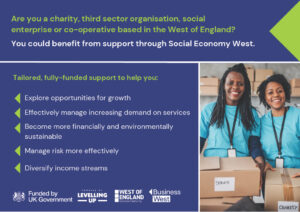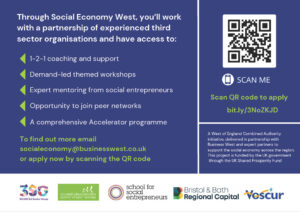Latest News and Events
(Click the Headline to see more information – click the Headline again to close)
We are delivering the Social Economy West Programme across South Gloucestershire, on behalf of Business West. This programme is about helping VCSE organisations to economically grow and thrive.
We can help you realise where your needs are and develop an action plan to meet those needs. We can offer tailored ongoing support which could include things like skills training, grant application support, signposting, advice on reorganising management as your organisation grows and more.
This fully funded support will offer a mixture of 1:1 mentoring sessions tailored to meet your organisations specific needs, themed workshops, and peer networks.
If you would like any further information, feel free to contact Hannah Hulbert at Hannah.hulbert@cvs-sg.org.uk, if you would like to apply, please scan the QR code on the flyer or contact Business West at socialeconomy@businesswest.co.uk


 The following, from or promoted by South Glos Council. courses are on their portal, bookable through links:
The following, from or promoted by South Glos Council. courses are on their portal, bookable through links:
Off the Record led courses:
Led by a self-harm lived experience specialist trainer:
Jigsaw-Thornbury Led courses:
PLEASE NOTE: Further courses will also be added to the South Gloucestershire Council portal through the year. Enquiries can be directed to mentalhealth@southglos.gov.uk.
Click here to see leaflet setting out further details of the courses South Gloucestershire Council are running or promoting this year, and click here click here for Bitesize events leaflet
 Wesport news and offers
Wesport news and offers
- The Happy Lane Fund is designed to open up tennis to people of all backgrounds and abilities across the West of England (Avon Tennis area). Find out more and apply here.
- Through the local Ageing Well funding for Live Longer Better, they have free Live Longer Better training licences. If you are interested in accessing this course as an individual or with a group from your organisation, please contact Sarah sarah.casselden@wesport.org.uk, you can find out more here.
They are supporting #WeAreUndefeatable to help people with long-term health conditions get moving in a way that works for them. If you’d like to learn more about the campaign, visit their website here.

The Road Ahead – NCVO
NCVO has launched the Road Ahead 2023 – exploring the trends, challenges and opportunities facing the VCSE sector in the year ahead.
The five major themes are:
From NAVCA (the National Association for Voluntary and Community Action – the national membership body for local support and development organisations in England)
The Government has announced a new Energy Bills Discount Scheme (EBDS) to run from 1 April 2023 for eligible non-domestic consumers in Great Britain and Northern Ireland. This replaces the current Energy Bill Relief Scheme for non-domestic customers, which comes to an end on 31 March 2023 and provided a reduction on wholesale gas and electricity prices.
The new scheme sets a cap of £5.5Bn on expenditure based on the estimated volumes that will be used. The aim is to provide a balance between supporting businesses for 12 months from 1 April 2023 to 31 March 2024 and limiting taxpayer expenditure.
Eligibility for Energy Bills Discount Scheme
The scheme is available to all non-domestic contracts including:
- businesses
- voluntary sector organisations and charities
- public sector organisations such as schools, hospitals, and care homes
who are:
- on existing fixed price contracts that were agreed on or after 1 December 2021
- signing new fixed price contracts
- on deemed / out of contract or standard variable tariffs
- on flexible purchase or similar contracts.
Amount of Discount
A discount will be applied to the unit price of gas and electricity for 12 months from 1 April 2023 to 31 March 2024. However, a cap will be applied so that the reduction in unit price is subject to a maximum amount. In addition, the discount will only apply if wholesale prices are above a certain price threshold.
From 1 April 2023 to 31 March 2024, all eligible non-domestic customers who have a contract with a licensed energy supplier will see a unit discount of up to £6.97 per MWh [Megawatt hour] automatically applied to their gas bill and a unit discount of up to £19.61per MWh automatically applied to their electricity bill.
This will be subject to a wholesale price threshold of:
• £107 per MWh for gas
• £302 per MWh for electricity.
If energy costs are below this level, the price reduction will not apply.
The discount is calculated based on the difference between the contracted wholesale price and the price threshold. The discount is phased in as the contract’s wholesale price exceeds the threshold price, until the total discount per MWh reaches the maximum discount allowable. i.e. once the contract price exceeds £302 per MWh for electricity the discount is applied up to a maximum of £19.61 per MWh.
This is different to the Energy Bill Relief Scheme which set an effective maximum price for energy. This gives only a maximum reduction available, prices may well be considerably higher than the threshold, even with a discount. As the discount will apply on a sliding scale up to a maximum capped amount, should prices rise considerably again, the impact of the discount will be small.
Customers do not need to apply for the discount, it will be applied automatically by suppliers.
This is effectively transitional support to move all non-domestic customers to paying the full costs of energy from 1 April 2024.
Energy Intensive Industries
Energy and Trade Intensive Industries (ETIIs) will receive a higher level of support, subject to a maximum discount. The maximum discounts and price threshold for these sectors are:
• a maximum discount of £89 per MWh for electricity with a price threshold of £185 per MWh
• a maximum discount of £40 per MWh for gas with a price threshold of £99 per MWh
• the discount will only apply to 70% of energy volumes
• Eligible ETII customers will have to apply for the higher level of support.
This applies to industries such as mining, quarrying, steel making, paper mills; manufacturing of chemicals, bricks, glass and rubber; domestic products including consumer electronics, domestic appliances, and textiles; and food production including bread, meat, beer and dairy. It also applies to four categories that in part fall within the charitable / VCSE sector. These are:
• 91.01 Library and archive activities
• 91.02 Museum activities
• 91.03 Operation of historical sites and buildings and similar visitor attractions
• 91.04 Botanical and zoological gardens and nature reserve activities.
The ETII does not apply to public sector bodies such as hospitals and schools and also excludes care homes. It also does not apply to hospitality sector, the VCSE sector or sports organisations.
Example Discounts
The Government have provided the following examples of how the scheme could be applied, as the level of support for each organisation will vary depending on type and date of contract.
These are illustrative examples only, based on recent averages of forward wholesale prices. Prices may differ from those experienced in practice.
Example 1: A pub
A typical pub uses 16 MWh of gas and 4 MWh of electricity each month. Under the new EBDS, bills may be reduced by up to £2,280 from 1 April 2023 to 31 March 2024.
Example 2: A small retail shop
A typical small retail store uses 2 MWh of gas and 1 MWh of electricity each month. Under the new EBDS, bills may be reduced by up to £403 from 1 April 2023 to 31 March 2024.
Example 3: A medium sized manufacturing business
A medium sized manufacturer uses 1,600 MWh of gas and 200 MWh of electricity each month. Under the new ETII scheme, it could receive a reduction of up to £687,120 on energy bills from 1 April 2023 to 31 March 2024.
For more detail, see the
Analysis
This scheme will help organisations with contracts signed at higher rates [before recent falls in the wholesale price] and provide others with reassurance against the risk of prices rising again. However, this represents a potential significant increase in energy costs for the VCSE sector from levels supported by the current Energy Bill Relief Scheme. For comparison purposes under the Energy Bill Relief Scheme which ends on 31 March 2023, prices were capped at £211 MWh for electricity and £75 MWh for gas. The new scheme lifts the bar for Government intervention to a much higher level with a much lower level of price support.
Wholesale prices for gas and electricity are currently reducing from their peak in the summer. As of the beginning of January 2023 electricity is at or around £200 per MWh. A contract signed at this sort of price today would not attract any additional support from the EBDS. For gas the current wholesale price is around £150 per MWh which therefore would attract a further discount of up to £6.97 per MWh reducing the wholesale price to around £143.
Whilst this assistance is welcome, more is needed to support the VCSE sector which is already facing very much significantly higher energy costs compared to 2021 prices. This will now leave frontline VCSE organisations that do not have the ability to pass on increased costs, with potentially unmanageable bills. The safety net for communities in the cost of living crisis that VCSE organisations are currently providing, is at risk if a solution is not found. VCSE organisations must have a sustainable future in order to meet the increasing demand of those most in need.
With others, we call on Government to meet urgently with VCSE sector representatives and energy companies to work together towards a sustainable resolution for current as well as future energy costs.
Warm and Well
If you or someone you know is struggling with their energy, whether with fuel debt, keeping warm, energy efficiency or any other energy-related issue you can get in touch with South Gloucestershire Council.
Through their Warm and Well adviceline they offer free energy advice and, since the scheme began in 2006, have supported with the installation of over 60,000 energy saving measures.
They can also provide an onward referral to their advocacy services, should there be a need further, more personalised energy assistance.
Call SGC now on 0800 500 3076, Monday to Friday, 9am-5pm
Our sighted guiding training teaches you how to guide a person with sight loss, with confidence, skill and empathy.
Much like learning how to perform first aid, sighted guiding is a useful life skill. It will give you the confidence to know how to act when you meet someone who is blind or partially sighted, and the guiding techniques to help them if they need it.
We offer two training programmes. Our ‘Introduction to Sighted Guiding Training’ is for anyone wanting to learn the basic skills. While our ‘Friends and Family Sighted Guiding Training’ is for those who want to help a loved one with a vision impairment, and meet people with similar experiences
Find out more information and to book here
